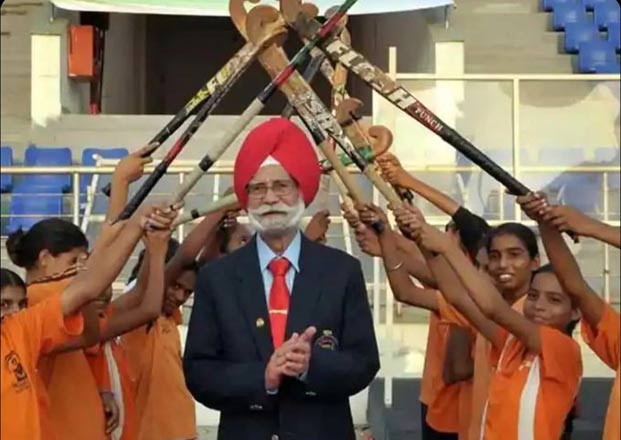Last Updated on May 25, 2020 12:21 pm by INDIAN AWAAZ

Harpal Singh Bedi / New Delhi
The grand old man of Indian hockey Balbir Singh (Senior) is no more. Considered to be one of the best centre forwards of his era ,the 96-year old hockey legend died at a Mohali Hospital, near Chandigarh on Monday morning, He was admitted to the hospital on May 8 due to pneumonia and was on ventilator support.
“He died at around 6:30 this morning,” Abhijit Singh, Director Fortis Hospital told media
Balbir (Sr) is survived by his daughter Sushbir, who is based in Chandigarh and three sons Kanwalbir, Karanbir, and Gurbir. all settled in Canada.
Triple Olympic gold medallist Balbir Singh Dosanjh, was better known as Senior to differentiate from the other five player named Balbir who represented the country later years.
The coinage of him being called senior was necessitated at the Tokyo Asian Games in 1958 where Hockey was introduced for the first time.
That squad had second Balbir Singh also who was also a forward but was from the army. Dosanjah being three time Olympian and captain of the team was suffixed as senior

According to veteran hockey commentator Anupam Ghulati there have been six-Balbir Singh s who have played for the country so far. Apart from Balbir Sr , the others were Balbir (1958 Asian Games, who retired as a Major and is based in Chandigarh) Balbir Singh Kular ( Punjab Police , col Balbir Singh (Services- both of whom played in the 1966 Asian Games and 1968 Mexico Olympics. Balbir Singh Grewal (Railways) the title winning goal scorer in 1966 and Balbir Singh Randhawa (Navy, -played for the country in an international tournament in Spain)
He was member of the 1948 London Olympics gold medal-winning team, He was the vice-captain of the victorious side which retained the title at 1952 Helsinki Olympics and had the distinction of leading the side to the top of the podium at 1956 Melbourne Olympics.
He was the first hockey player to be awarded the Padma Shri in 1957 . In domestic tournaments he played crucial role in helping his state Punjab win six-national titles.
After his retirement Balbir (Sr) was the chief coach-manager of the Indian team starting 1961 and took over the chief coach’s role in eight tournaments till 1982.
He had another distinction of being the chief coach at the 1975 Hockey World Cup winning team. This remains India’s only title win at the event so far.
Interestingly as a chief coach in eight tournaments his team always had a podium finish including a gold medal at the 1966 Asian Games, the goal scorer in the final against Pakistan was another Balbir Singh Grewal, bronze at the 1971 World Cup, bronze at 1982 Champions Trophy and silver at 1982 Asian Games.
The versatile centre-forward was the only Indian among 16 legends chosen by the International Olympic Committee (IOC) across modern Olympic history.
His record for most goals scored by an individual in the men’s hockey final of the Olympics still remains unbeaten. He scored five goals in India’s 6-1 victory over the Netherlands at the 1952 Helsinki Games
Born on December 31, 1923 to Sardar Dalip Singh and Karam Kaur at his maternal village of Haripur Khalsa. He had started his career as a goalkeeper with his school team at Moga before playing as a defender and later a centre forward.
He initially played for Sikh National College, Lahore in the early 1940s before shifting to Khalsa College, Amritsar in 1942 He led Panjab University to three All India Inter-university titles in 1943, 1944 and 1945 and was part of the undivided Punjab squad in the national championships of 1947 just before partition.
At London Olympics he scored six goals, including a hat-trick, against Argentina in India’s 9-1 win in the second game. In the final, he scored two goals in the 7th and 15th minutes against Great Britain at Wembley Stadium
Tarlochan Bawa and Pat Jensen scored the other two goals as India won the final 4-0, and it was the first time that the Indian flag was unfurled in a sporting event after Independence in England.
He was the vice-captain of the Indian team led by KD Singh Babu at the 1952 Helsinki Olympics. The centre forward scored three goals against Great Britain in the semifinal before scoring five out of the six goals against the Netherlands in the final, a record which stands till now.
At the 1956 Melbourne Olympics, Balbir who led the side scored five goals against Afghanistan in the opening match before being injured. He played in the semifinal against Germany and final against Pakistan with an injured right hand as India won their sixth Olympic gold medal.
